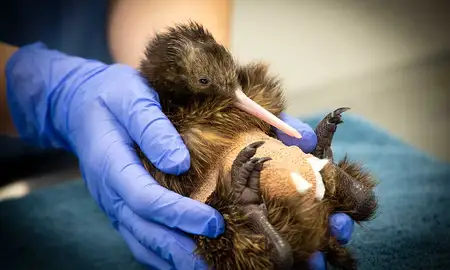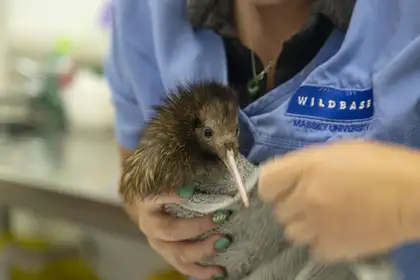
Image credit: Brittany Adams (Palmerston North City Council).
Coccidiosis is a prevalent parasitic disease that can affect the gastrointestinal tract, kidneys and liver in kiwi. It is currently the most significant disease faced in captive-reared kiwi and has historically resulted in high rates of illness and, in some cases, death in kiwi chicks reared through Save the Kiwi’s Operation Nest Egg (ONE) Programme.
While previous research has led to improved management of the disease, PhD student Emma Scheltema says there’s a need to establish a more viable treatment method to improve kiwi welfare and captive rearing success.
“Recent evidence has shown the efficacy of the primary drug used to treat coccidia in kiwi is declining so there’s a need to establish alternate drugs and treatment plans to enable effective management of the disease.”
Associate Professor Kerri Morgan is Emma’s PhD supervisor and is working with her on this project. Dr Morgan has produced previous studies around coccidiosis in kiwi which have provided the foundations for this project, including identifying five different species of coccidia that affect kiwi.
Current diagnostics methods can detect the presence of coccidia but differentiating the species can involve an extensive work up. Emma says this project will continue building upon the work completed by a previous PhD student to develop a diagnostic tool that can offer more detail about the infected kiwi.
“The idea is to develop a polymerase chain reaction (PCR) test that can tell us which species are present in a kiwi faecal sample, and hopefully how many.”
Dr Morgan says the results from this project will have significant positive influence on kiwi conservation, including informing and improving kiwi husbandry by identifying optimum treatment practices.
“This will be applied research so the information Emma is finding out is going to directly impact and inform the management of kiwi. We’ll be able to provide evidence-based advice on which treatments to use, how often to use them and the best way to diagnose the problem with the aim to lower the impact of this disease in captive reared kiwi.”
By helping improve captive rearing conditions, Dr Morgan says their work can contribute towards the goal of increasing kiwi populations by two per cent annually.
“The goal for each kiwi is to reach one kilogram before release and we know coccidiosis can impact growth rates. Improving treatment protocols can reduce time spent in captivity for each chick, meaning the financial costs and resources could potentially be reinvested into rearing a larger number of birds.”
The project is made up of two studies which have been built around the kiwi breeding season from October to April, during which kiwi eggs from various conservation projects around Aotearoa New Zealand are hatched and reared at the National Kiwi Hatchery in Rotorua via Operation Nest Egg. For this project, the team are working with Maungataniwha chicks which are the largest group of kiwi involved in the Save the Kiwi programme.
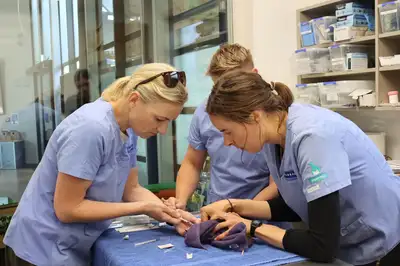
Emma Scheltema (right) holding a kiwi chick for Associate Professor Kerri Morgan to take a blood sample from. Image credit: Brittany Adams (PNCC).
The first part of the study, which began in November last year, focuses on determining the safety and pharmacokinetics of five anticoccidial drugs in kiwi chicks. Emma says this involves monitoring how the kiwi handle the medication in their system and how long it lasts to determine the correct dose rate for each drug.
“We take blood samples for each kiwi chick at specific times before and after dosing with one of the candidate drugs. This allows us to measure how quickly the drug is metabolised as well as monitor the chicks for any potential drug-related adverse effects. During this time, we also monitor the food intake, weight and activity levels of each chick. We review our night-time camera footage each morning so we can ensure they’re displaying normal kiwi behaviour like foraging.”
Emma says the second study, with trials starting later this year, will continue to build off this work focusing on the efficacy of the drugs deemed suitable in treating and controlling coccidiosis.
“We’ll be treating infected kiwi, which is where the diagnostic tool will be incredibly helpful, as it will mean we can test them daily to check coccidia numbers and it will give us a more detailed picture of how they’re responding to the treatment.”
The project was funded by the George Mason Charitable Trust through the Massey University Foundation. The Trust has sponsored $180,000 for the three-year period which covers research funding and costs as well as provides Emma with a PhD Scholarship.
Emma says she’s incredibly grateful for the support from the George Mason Charitable Trust and to all those involved in the running of the project.
“Dr Mason checks in every three months. He has a real interest in this project but also in helping students and shaping young people to become scientists. It’s such a rare opportunity to do this type of research on wildlife and I feel very lucky with all the support we’ve received. From Central Energy Trust Wildbase Recoveryallowing us to use their facility for the research, to the willingness and support of the landowner Simon Hall and the Forest Lifeforce Restoration Trust, local Maungataniwha iwi as well as National Kiwi Hatchery, Save the Kiwi and Cape Sanctuary. There’s a lot involved to get over 30 kiwi chicks down to us for this project and it’s a huge expression of trust, so we’re incredibly thankful.”
Related news
Ruru returns to the wild after appointment with the optometrist
A little ruru, or New Zealand morepork, has been released back into the wild after receiving treatment and rehabilitation following a head injury.
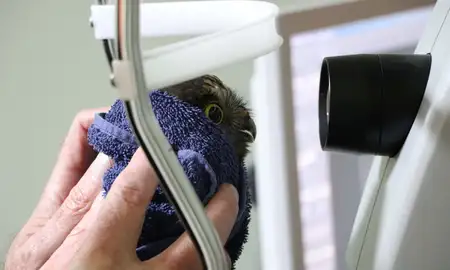
Staff celebrated at teaching and research awards
The recipients of the 2019 and 2020 Massey University Teaching Awards and Research Awards were honoured at a cross-campus Zoom-enabled event on 26 March.
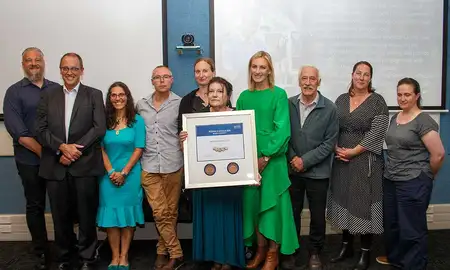
Kiwi saved during hatching at Wildbase
A kiwi chick has been saved by wildlife experts at Massey University and Pūkaha National Wildlife Centre after complications during hatching.
